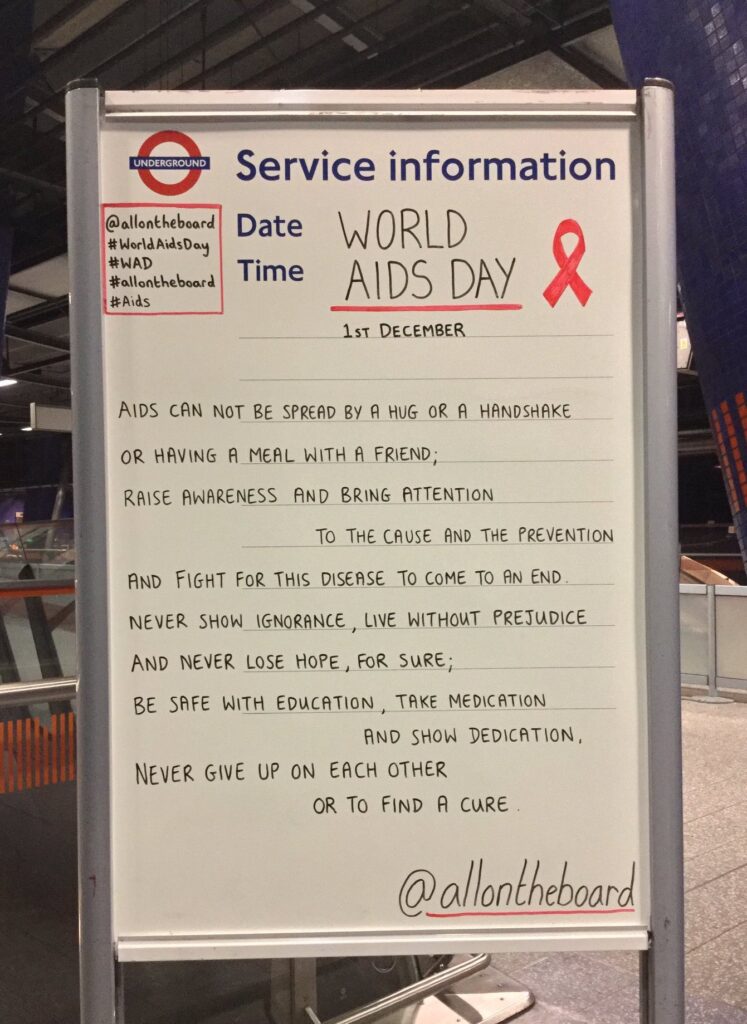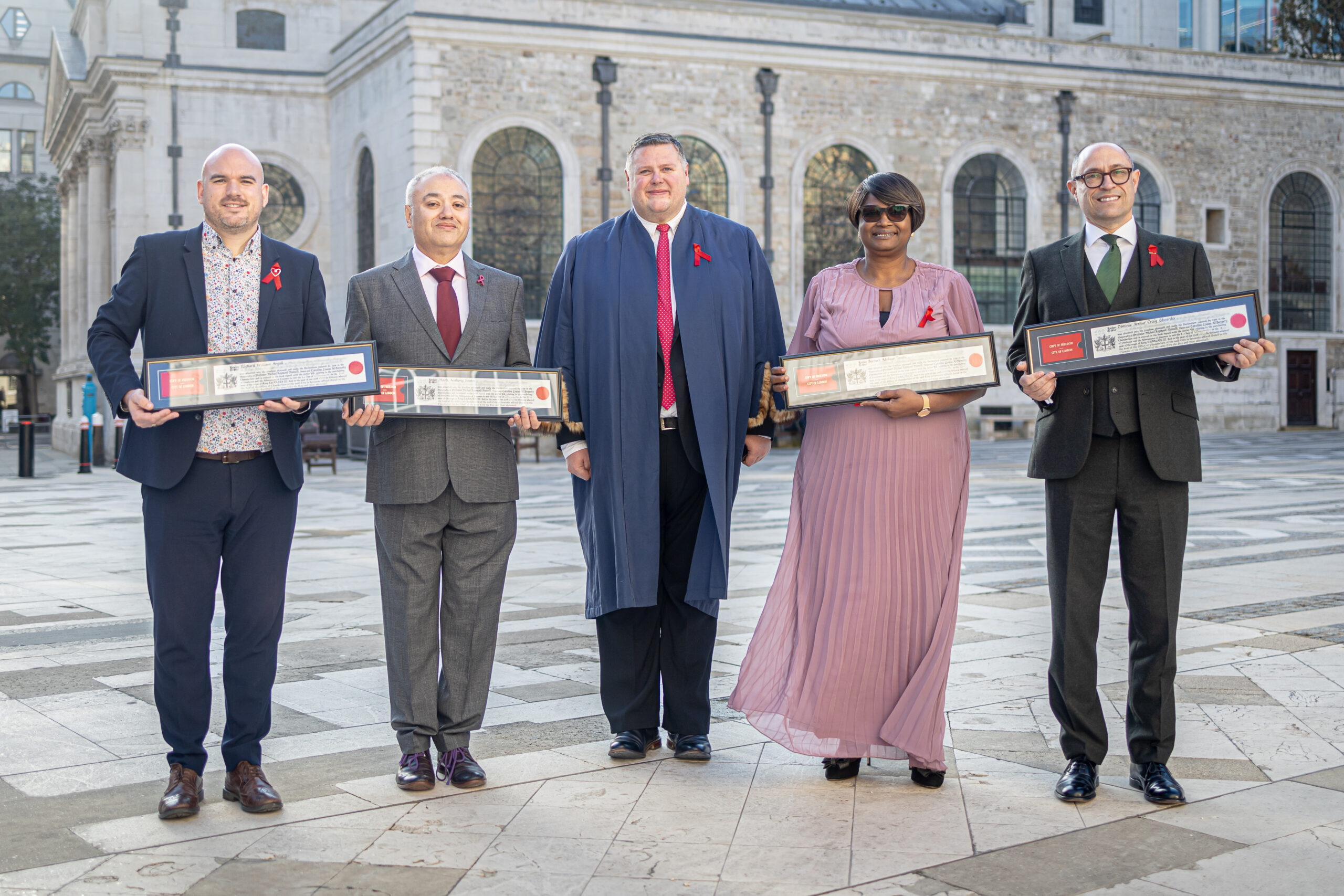World AIDS Day takes place on the 1st December each year and brings together people from around the world to raise awareness about HIV/AIDS and demonstrate international solidarity in the face of the pandemic.
The day is an opportunity for public and private partners to spread awareness about the status of the pandemic and encourage progress in HIV/AIDS prevention, treatment and care around the world. It has become one of the most widely recognized international health days and a key opportunity to raise awareness, commemorate those who have died, and celebrate victories such as increased access to treatment and prevention services.
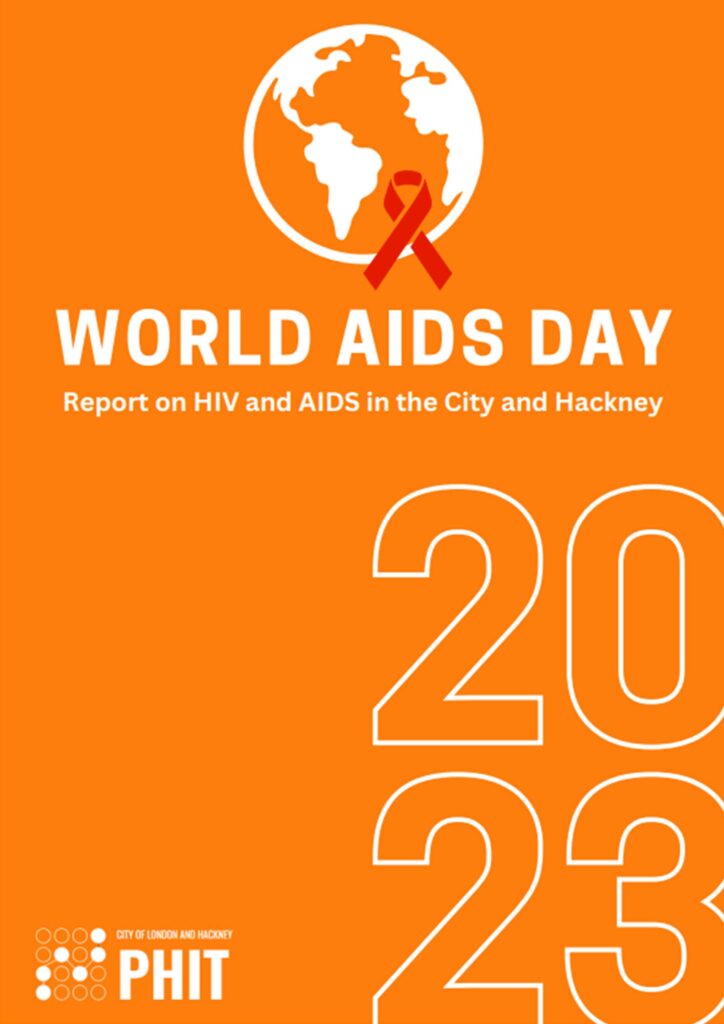
This year, the City of London Corporation‘s Public Health Intelligence Team have published an HIV and AIDS report to mark the occasion. Whilst there has been remarkable scientific advances, there is still a long way to go. The facts are:
- In 2022 the City of London had the second-highest prevalence rate of HIV in England, behind Lambeth.
- The City and Hackney have consistently reported a higher rate of new HIV diagnoses than London and England over the past eight years.
- New HIV diagnoses in City and Hackney were almost equally acquired through sex between homosexual and heterosexual contact.
- Across London as a whole, diagnoses were more likely among older age groups, with the highest proportion of new diagnoses being recorded among people aged 35-49.
- Recent evidence from the new opt-out blood-borne virus (BBV) testing program shows that certain groups, like people of black African ethnicity and those in the most deprived areas, have the highest rates of new HIV diagnoses when tested opportunistically.
- Between 2020 and 2022, 36% of newly diagnosed HIV cases among City and Hackney residents were diagnosed at a late stage of infection. This is lower than in London and England. However, nationally, in 2019, those diagnosed late were more than seven times as likely to die within a year compared to those diagnosed at an earlier stage.
So, we know that early diagnosis and testing is a critical element in improving life chances and that is why the Terrence Higgins Trust‘s Campaign to expand BBV opt out testing is critical (i.e. each time you have a blood test, you are automatically tested for HIV, Hepatitis B and Hepatitis C).
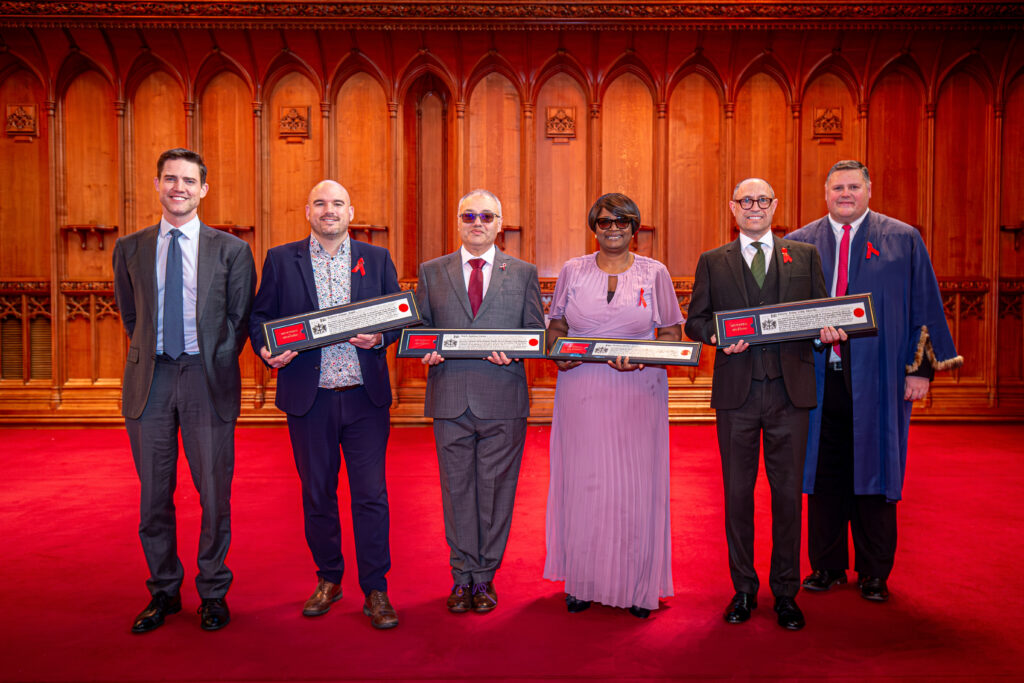
The City of London have a long history of trying to bring about change in this area. It was the Barts Health NHS Trust which launched a national campaign called “Going Viral” to routinely test emergency patients for BBVs. Their campaign managed to get the first 10 hospitals (7 in the capital) to sign-up to testing in October 2014. Just this week, the Government announced an expansion of BBV opt out testing at 46 more hospitals across the UK.
I am also proud that in addition to BBV opt out testing in Emergency departments, the City and Hackney have now started opt out HIV testing as part of the NHS Health Checks programme for people over 40. This is already proving successful in widening HIV testing and ensuring the connection to treatment is strong. Given we know late diagnosis often occurs in people now 40+, this is a great opportunity to pilot the approach and support its roll it.
Across NHS North East London we have also successfully implemented opt out HIV testing in primary care, when a clinician raises a Glandular Fever type illness test, as the symptoms are identical to HIV infection – again over the last 5 years this has been very successful at diagnosing patients. Rolling this out across London would be hugely beneficial.
Stigma remains a barrier to people testing and accessing life-saving treatment. Within the City, we are working to create HIV Ambassadors and to create an HIV anti-stigma charter, which we hope to be adopted by public sector organisations as part of a wider programme.
As with all public health messaging, we must continue to educate the public with facts and we should proudly celebrate progress. That is why this World AIDS Day, I was delighted to welcome four leading charitable figures from the sector to the Guildhall to receive the Freedom of the City of London. My nomination was generously supported by the Chair of the City of London Corporation’s Health and Wellbeing Board Mary Durcan CC, the Chair of the Civic Affairs Sub Committee Tom Sleigh CC, the PRIDE Staff Network and was unanimously approved by the Freedom Application Sub Committee and the Court of Common Council.
The Freedom Ceremony was kindly conducted by the Chamberlain of the City of London, Caroline Al-Beyerty and the Clerk to the Chamberlain’s Court, Laura Miller. The ceremony was followed by a congratulatory luncheon, to welcome the “newest citizens of London” to the Freedom and thank them for the tremendous impact their work has had in the HIV and AIDS sector.
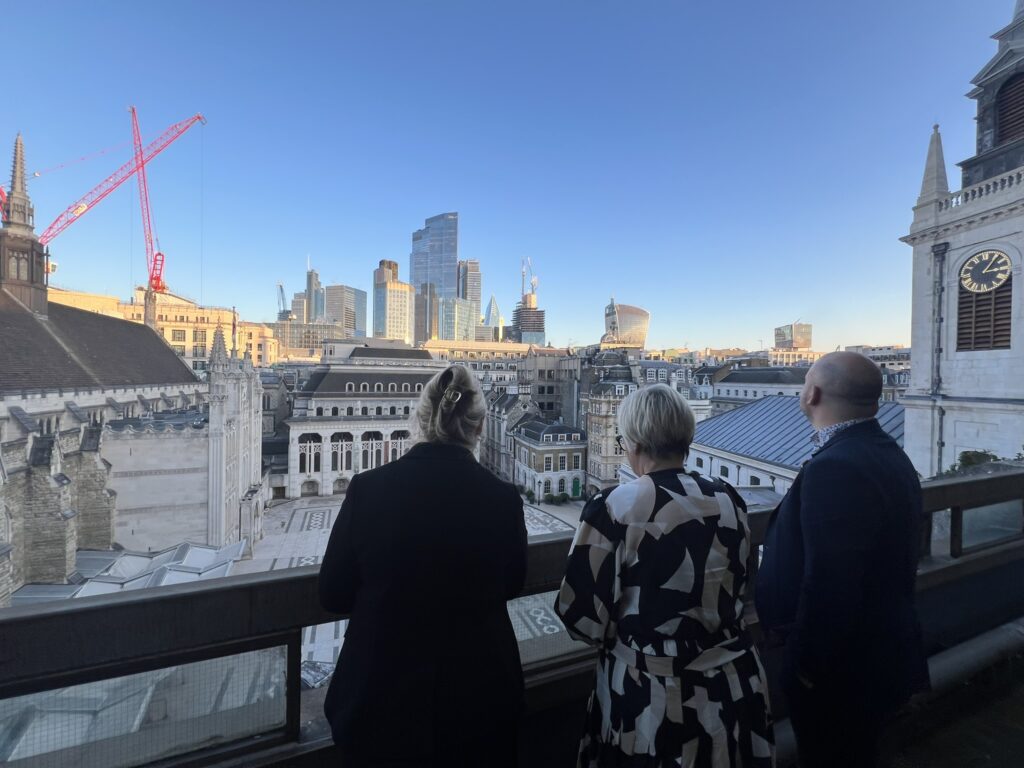
The media release relating to the Freedoms is outlined below:
On World AIDS Day, four leading figures from two major HIV charities have today been awarded the Freedom of the City of London, in recognition of their outstanding work to support people and communities living with HIV.
The Chief Executive of Terrence Higgins Trust, Richard Angell, was joined at Guildhall by the charity’s Director of Communications and HIV Services, Dominic Edwardes, and its National Advice Supervisor, Barbara Tinubu. The East London-based Positive East charity, which was established in 1991, was represented by its Executive Director, Mark Santos.
City of London Corporation Policy Chairman, Chris Hayward, said:
“Tremendous work has been done over the last three decades in the fight against HIV/AIDS, in terms of early detection, treatment, prevention, service provision, and reducing the stigma of living with the virus.
“The Terrence Higgins Trust and Positive East must be commended for their sterling work in supporting people and communities, and it is due to the commitment, hard work, and campaigning zeal by people like Richard, Dominic, Barbara, and Mark that our communities feel so supported, and that significant progress and achievements have been made.”
City of London Corporation Councillor, Ben Murphy said:
“The ancient award of the Freedom of the City of London remains relevant today when it is used to pay tribute to individuals who go the extra mile and make a tangible difference to people’s lives.
“This could not be more true of Richard, Barbara, Dominic, and Mark, and today, we are proud to recognise their work at the Terrence Higgins Trust and Positive East, and to admit them into the Freedom at Guildhall.
“The City of London Corporation is committed to the government’s target of no new cases of HIV by 2030 and is working with partners to increase HIV testing, improve access to prevention, including PrEP and condoms, as well as making it even easier for people who are newly diagnosed to access treatment.”
Chairman of the City Corporation’s Port Health and Environmental Services Committee, Mary Durcan, said:
“I am delighted to join the chorus of praise for these two charities’ outstanding work over the years, and I was very pleased indeed to support their nominations for the Freedom.
“The City’s award today is our way of congratulating them on their achievements and giving them some well-earned recognition.”
Chief Executive of Terrence Higgins Trust, Richard Angell, said:
“It’s an honour to be receiving the Freedom of the City of London. I’d like to dedicate this special award to the millions sadly lost to HIV since the start of the epidemic and those whose shoulders we stand on.
“The progress that we’ve made would not have been possible without their efforts and sacrifices, and we will do everything that we can to end new HIV transmissions in the UK by 2030, because we owe it to them.”
Director of Communications and HIV Services at Terrence Higgins Trust, Dominic Edwardes, said:
“I am proud to be awarded the Freedom of the City of London. It’s remarkable how much progress we’ve made around HIV – today we’re working to end new HIV cases in the UK by 2030, something that would have been unimaginable when I started working for Terrence Higgins Trust in 1999. This is an opportunity we cannot let pass.”
National Advice Supervisor at Terrence Higgins Trust, Barbara Tinubu, said:
“It’s a privilege to be awarded the Freedom of the City of London. From working with London Lighthouse in 1999, to Terrence Higgins Trust today, I’m proud to have been there for people living and affected by HIV in the city for over two decades and remain dedicated to ensuring they get the support that they need.”
Executive Director of Positive East, Mark Santos, said:
“I am delighted and honoured to be receiving the Freedom of the City of London. I see it as a recognition of the work of Positive East for over 30 years, addressing the HIV needs of City and East London residents.
“It is a recognition of the City of London’s continued commitment to being in solidarity with people living with HIV, challenging HIV stigma and working towards ending new transmissions of HIV.”
One of the City of London’s ancient traditions, the Freedom is believed to have begun in 1237 and enabled recipients to carry out their trade.
.
As well as being nominated for, or applying for, the Freedom, it is also offered by the City of London Corporation to individuals as a way of paying tribute to their outstanding contribution to London or public life, or to celebrate a very significant achievement.
Recent high-profile recipients include the UK’s Chief Medical Officer, Professor Sir Chris Whitty; England football captain and former Tottenham Hotspur striker, Harry Kane; Deputy Governor for Financial Stability at the Bank of England, Sir Jon Cunliffe; and theatrical impresario, Sir Cameron Mackintosh.
About the Freedom of the City of London recipients:
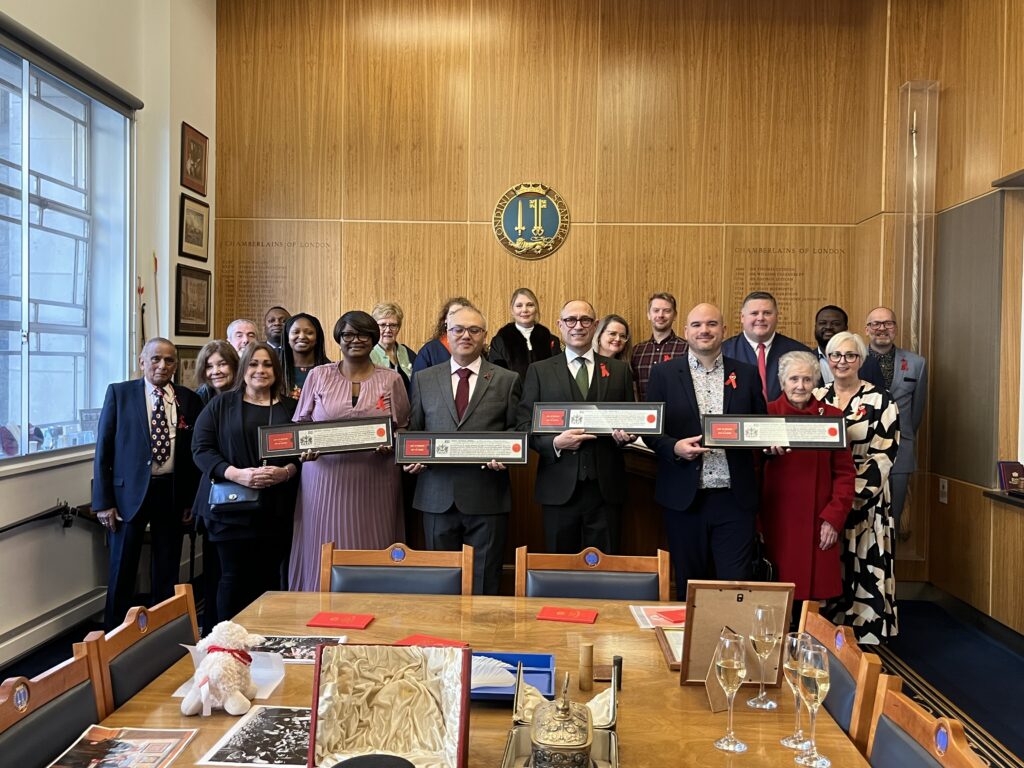
Richard Angell:
Richard Angell is Chief Executive of Terrence Higgins Trust. He was previously the charity’s Campaigns Director and interim Head of Policy & Public Affairs.
Richard led a year’s worth of activity to mark 40 years since Terry Higgins became the first named person to die of an AIDS-related illness and our charity was established in his name.
Other key successes include an integral role in securing £20million Government funding for opt-out HIV testing in emergency departments and leading on work to successfully overturn discriminatory exclusions in blood donation for gay and bisexual men and those primarily from the UK’s black communities.
A graduate of the University of Birmingham, Richard was previously Director at think tank Progress and worked with political leaders in both the UK and Australia. He also has a history of providing policy, communications and fundraising strategy advice to organisational leaders across the public, private and not-for-profit sectors.
Barbara Tinubu:
Barbara has dedicated over 20 years to supporting and advising people living with HIV. She’s worked in many different teams within Terrence Higgins Trust, the country’s leading HIV and sexual health charity, and is now the charity’s National Advice Supervisor.
Barbara always goes that extra mile and ensures that service users get the best support possible. Her expertise and knowledge in immigration and welfare matters are vast and many service users would have lost their home, employment and safe space if it was not for Barbara’s support. In her own time, she helps run the Bethnal Green-based African Women’s Welfare Association.
Dominic Edwardes:
Dominic Edwardes has worked for Terrence Higgins Trust since 1999 and is now its Director of Communications and HIV Services. He has been responsible for the development of the well-known Terrence Higgins Trust brand, worked on over 30 behaviour change campaigns and led the development of the charity’s digital presence, including its pioneering peer support service and online chat.
Dominic has a strong commitment to providing evidence-based, user-tested health and social care information. He was previously Co-Chair of the Executive Council of The Information Standard, an NHS England initiative to help organisations produce high quality health information.
He is also a lover of literature, chairing the Trollope Society, helping share this iconic British novelist with new generations.
Mark Santos:
Mark Santos is the Executive Director of City and East London HIV Charity Positive East, a post he has held for over two decades. In 1996 he first joined one of the partner agencies that later formed Positive East as its Housing Advice Worker, becoming its Advice Services Manager in 1997 and its Executive Director in 2000.
Mark led the merger process that created Positive East in 2005. Positive East supports people living with HIV to live full & healthy lives, challenges HIV stigma, and works towards ending new transmissions of HIV.
